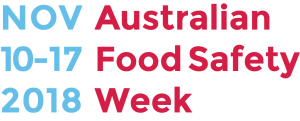Under embargo until 10 November 2018

Food poisoning – take it seriously Australian Food Safety Week 10 -17 November 2018
As part of Australian Food Safety Week [Name] from [Organisation] today urged local consumers to take food poisoning seriously.
‘We need to remember that food poisoning isn’t just a minor stomach upset but it should be taken seriously as it can be fatal. The Listeria outbreak linked to Australian rockmelons earlier this year resulted in 7 tragic deaths and a miscarriage. This was followed by a recall of imported frozen vegetables which was linked to 47 listeriosis cases and 9 deaths in Europe and 1 death in Australia’ [Name} said.
‘Listeria are bacteria that are widely found in the environment so most raw foods are likely to be contaminated. You don’t have to miss put on your favourite foods as Listeria is easily killed by cooking so, for example, you can easily add ham to a pizza, feta to a quiche or smoked salmon to fully cooked scrambled eggs. Just remember that cooked foods can easily become re-contaminated through poor food handling after cooking. For foods that can’t be cooked you can make other choices such as using fresh whole lettuce for salads rather than bagged lettuce.
‘If you are at risk of Listeria infection you need to avoid, or where possible cook, the following foods:
- Unpackaged ready to eat meats from delicatessen counters and sandwich bars; packaged, sliced ready-to-eat meats; cold cooked chicken purchased ready to eat, whole, diced or sliced and refrigerated paté or meat spreads
- All soft, semi soft and surface ripened cheeses e.g. brie, camembert, ricotta, feta and blue (pre-packaged and delicatessen), unpasteurised dairy products (e.g. raw milk or cheeses) and soft serve ice cream
- Pre-prepared or pre-packaged cut fruit and vegetable salads e.g. salads sold in bags or containers or from salad bars, shops or buffets, etc; pre-cut fruit and vegetables that will be eaten raw; frozen fruit or vegetables that may not be further cooked (e.g. berries, peas, sweet corn); rockmelon/cantaloupes (whole or cut); and bean or seed sprouts
- Raw seafood (e.g. oysters, sashimi or sushi); smoked ready-to-eat seafood; ready-to-eat peeled prawns (cooked) e.g. in prawn cocktails, sandwich fillings; and prawn or seafood salads; and seafood extender.
‘It’s important you maintain a healthy and varied diet if you are pregnant, elderly or immune compromised so we recommend you also talk to your GP or an accredited practicing dietitian about how to eat well while avoiding foods at risk of Listeria.
Also follow these food safety tips to reduce your risk of Listeria infection as well as other forms of food poisoning:
- Always wash your hands with soap and running water and dry thoroughly before handling food and keep food utensils and cooking areas clean
- Unlike most other food poisoning bacteria, Listeria can grow at refrigeration temperatures, so ready to eat food or leftovers should never be stored in the fridge for more than 24 hours. Since Listeria grows slowly in the fridge, it will do so only very slowly at cold temperatures so make sure your refrigerator is keeping your food at or less than 5°C.
- Avoid refrigerated foods that are past their ‘use by’ date
- Refrigerate leftovers promptly and use or freeze within 24 hours
- Always look for cooking and storage instructions on the food package label and follow them when provided.
- Cook high risk foods such as poultry, minced meat, sausages, hamburgers and leftovers to 75°C
- Cook egg dishes, such as quiche, to 72°C in the centre (or until the white is firm and the yolk thickens).
Find out more about listeria and test your knowledge with a food safety quiz on the Food Safety Information Council website www.foodsafety.asn.au ,’ [Name] concluded.
[INSERT paragraph/s involving local issues if appropriate and/what events are occurring locally during Food Safety Week]
Media Contacts:
[ADD LOCAL CONTACT DETAILS]
or Lydia Buchtmann, Food Safety Information Council, 0407 626 688
